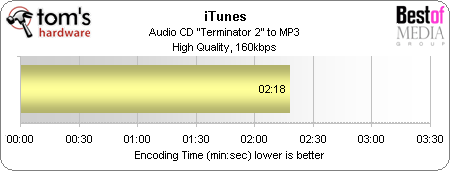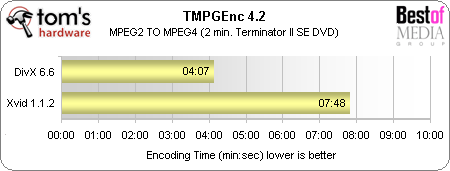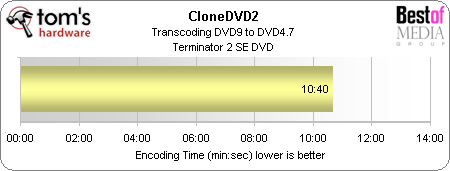System Builder Marathon: Low-Cost System
Application Benchmarks - Media Encoding
The first tests we ran were the video and audio encoding benchmarks. Let's start with the iTunes benchmark, which measures how long it takes the iTunes program to convert a half-gigabyte wave file to AAC:
A little over two minutes for an almost full CD-sized file. Next, we tried the Lame benchmark version of the same task...
...the benchmark refused to complete, stopping itself - but not locking up - after 30 seconds of encoding. At first we thought we'd finally encountered a repeatable result of the Phenom's TLB erratum patch being disabled, but when we enabled the patch we got the same result. This prompted us to question the system's stability, so we ran some long stress tests and found that the PC was rock solid. It is important to note that this was the only benchmark that offered us any problems whatsoever. With no evidence of system instability and no other explanation presenting itself, it is difficult to diagnose the issue.
Under the gun and without the time for in depth testing of this lone problem, we had to move on to video encoding using TMPGEnc:
TMPG shows us that the DivX encoder is faster than the Xvid encoder, but without results from another machine we can't really draw any other conclusions yet. On to the DVD transcoding benchmark using CloneDVD 2.
The system transcoded the Terminator 2 DVD in just over 10 minutes, which seems like a pretty good result without comparative data.
With the media encoding benchmarks complete, let's move on to image rendering.
Get Tom's Hardware's best news and in-depth reviews, straight to your inbox.
Current page: Application Benchmarks - Media Encoding
Prev Page Synthetic Benchmarks Next Page Application Benchmarks - 2d And 3d RenderingDon Woligroski was a former senior hardware editor for Tom's Hardware. He has covered a wide range of PC hardware topics, including CPUs, GPUs, system building, and emerging technologies.
-
Retrogame The $500-$700 system is more important than you realize: it's an extremely important price point in the "Consoles vs. PC wars"Reply
For about $500, you can buy a top of the line current generation PS3 or XBox 360 with a few accessories.
Of course, there are always games better on one platform than the other; and naturally, your PC is a lot more versatile; i.e. it's a "REAL COMPUTER!" Even so, it's nice to know that you can actually put together a low cost machine, overclock it a smidgen, and still run this games representative of this year's crop of PC titles... and if you were to actually scale down the graphics settings to the same level that the consoles would be running things at, probably end up with better frame rates and the advantage of using a nice monitor instead of a TV.


